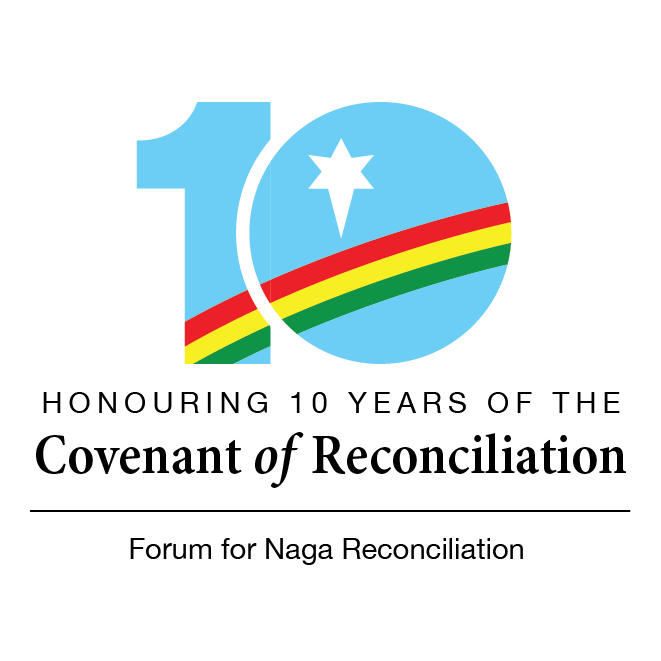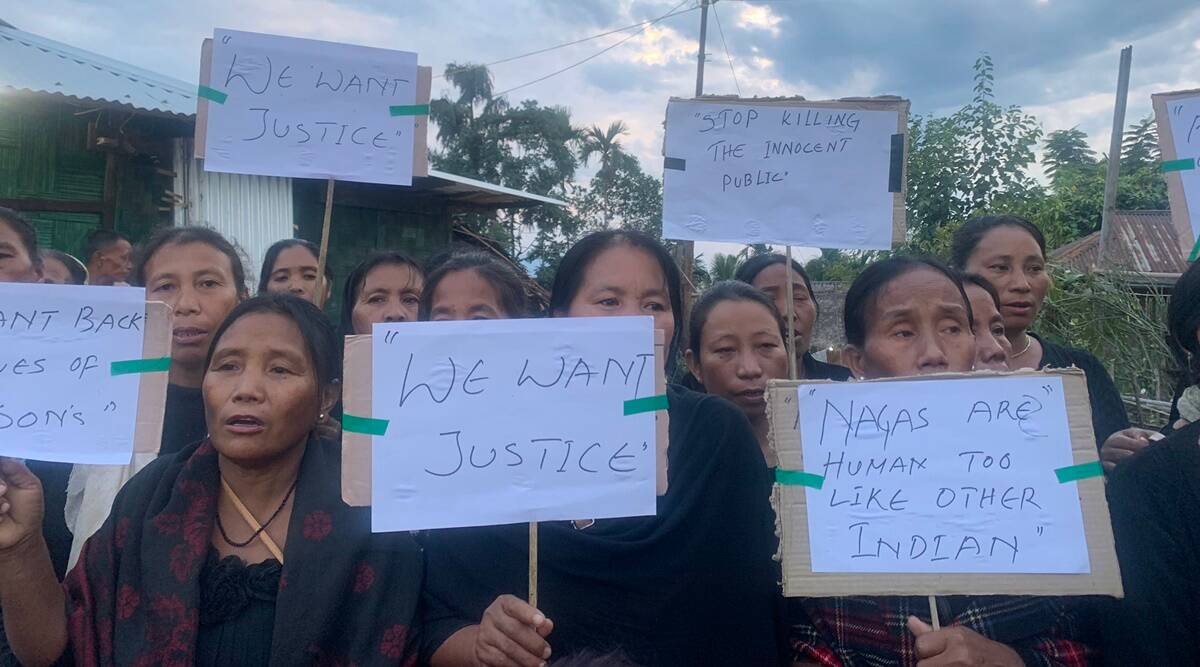By Lipichem*
Many a leaders around the world are telling us that solution to all societal problems is to just build a virtual wall around us; to keep certain people out; take care of our own and let society take care of itself. Ironically, this view is the very source of our suffering in conflict, if not the conflict itself. At the core of this view is an idea, a story that ‘we’ are somehow different from ‘them.’ We generally tell our own story of separation and struggle without acknowledging the common cause of conflict.

JOURNEY OF COMMON HOPE: The Joint Working Group (JWG) of the NPGs and the FNR travelled with the message of reconciliation to various areas of Naga-land. This file photo shows women and men from different walks of life a public meeting with the JWG in Phek Town (February 2010).
“The cherished culture and tradition of Nagas should unite us irrespective of our flaws and differences. Life is wonderful when our door is always open and our homes are safe. Everything you see is beautiful. The weather seems perfect whether it is sunny, rainy or windy. Once again, our kitchen should become a place for peace and healing, where we listen to each other without been judgmental, and sincerely enjoy sharing stories of triumphs and loss, folk tales and legends. We have to awaken ourselves and consciously think of bringing back these ingredients to our kitchen,” opined an octogenarian who has taken part in healing and forgiveness in his community.
We often identify ourselves on tribal lines, by zone, area and clan. By identifying that way, we are made to believe that these labels and roles define who we are. Closely associated to our story of separation is the story of comparison. The moment we identify ourselves by certain roles and labels, we compare ourselves with others, immediately seeing ourselves as ‘better than’ or ‘worse than’ from the people who identify themselves from us.
Nagas have bottled up anger and frustration, which has acted like poison bursting at the wrong moment, and is destroying the most valuable cause that we have been holding onto for decades. We believe that there is a right way and a wrong one. And if, someone does not conform to our ideas and beliefs, we tend to become upset and defensive. We end up shutting the door of communication that is key to reconciliation.
And connected to our story of judgment is the story of expectation. Expectation is our idea of how things, especially the people and solution should come about. However, in order to achieve that, the persons involved should take the responsibility and initiative and seek forgiveness. “Trust, courage and humility are key parameters of paramount importance in any honest reconciliation. Betrayal to this, is a taboo which will yield a bad omen in the community or family,” shared a community leader.
What does Reconciliation mean to people in the peripheries?
The issue of reconciliation has gained such an international salience that the last decade is even widely called “the age of reconciliation.” However, back home, Nagas view reconciliation differently. We need to relook and reflect where we have gone wrong and take steps.
Naga elders from the border who were actively advocating for peace narrated that, “though the process of Naga reconciliation has brought some peace because it ceased the killings, but we are unaware about the happenings at high level. It may be because we are living at the border. For us, peace has become a commodity. Unless, we bargain with something in cash and kind we don’t get it. Peace has become ‘conditional’ shared a frustrated elder. “However, reconciliation process is very encouraging and we should all encourage it, we cannot continue to live with the blood of our brothers in our hands.”
In a traditional way, to restore a broken friendship, recognizing one’s mistake is a pre-requisite. This comes with an honest effort at self-examination and acknowledging the truth. If a person is offended by someone, it is the responsibility for the victim to allow the offender to correct the wrong done committed to by him/ her. This is how reconciliation with the other person and with self is made.
A woman from the border shared the pain they have undergone in the villages and recalled, “playing football, dining together and travelling in the name of reconciliation in foreign land makes no sense. In our tradition, the moment we share food or tobacco, it marks the end of a conflict or enmity. Nagas are misusing the sanctity of reconciliation, which may become futile for the entire generation,” she added.
Naga women remained unsung heroes in history and even in Naga national movement. Sharing the stories from yesteryears, mothers with lived experiences narrated how they risked their lives for the movement. In situations of conflict, when men fail to bring solutions women take the lead with the image of “mothers as peacemakers.” Recollecting the times of tribulation, women of Phungkhuri shared how they climbed the cliff with ropes to carry food rations for a certain faction to avoid factional clashes.
Many have travelled and walked by foot for peace. They also walked at night into the deep jungle to negotiate with rebels to prevent fighting amongst each other. Until today, many are taking an active part in peace-building initiatives, yet they remain invisible and absent in formal peace negotiating tables. If true reconciliation is sought it is critical to engage women in the formal peace processes.
The lived experiences of older Naga patriots are still alive in their stories. Listening to their stories constantly revives and ignites the spirit of freedom in us. The freedom movement has come a long way, with countless patriots giving up their lives for the cause. Many Naga families also gave what they had in their hearth, to support the movement. A village elder reminisced “on some days when we are about to cook the last remaining rice at home, the national workers would come to collect ration tax. Even if our pot over the fireplace is boiling with water, we would voluntarily give away the rice and skip the cooking.” Such act of sacrifice was common then. Earlier old and young Nagas took pride in the movement, but is a different picture now. This change may have been because lay people have become more disconnected from the movement’s ideology with every passing day.
There was a time when our commitment for free Nagaland was high, but, with the passage of time, vision and commitment has started to lose its meaning. No doubt, the spirit of patriotic feeling remains strong, but it cannot unify us because of our competing views and egos, our commitment to the cause is been dented.
Anything that is good has to die or regenerate to begin anew. The time has come for Nagas to evaluate and reexamine our commitment with our visionary leaders.
The process of reconciliation hasn’t reached the desired goal because we continue to give our own justification to conveniently support our wrongs and keep the truth in a safe distance, thereby silencing the truth. Therefore, it becomes crucial to have Truth Commissions to facilitate the process of truth-telling.
In this aspect, a Truth Commission could contribute to conflict transformation by creating spaces where people feel safe and can honestly talk about their fears and hopes, hurt and responsibilities. How do we know these walls, that seem so real, are just arbitrary stories and not who we are? We know because we are not born with these walls. We all must seek an honest answer together.
Honest communication from all sections is important for peace-building and reconciliation in this relationship. It is a God-given gift we have to learn to use, to help us understand others and help others understand us, so that we can relate to each other and have a relationship build on trust. Otherwise, any relationship built on assumptions and expectations may become the root cause of the problem. Lasting relationships can only be built upon the foundation of mutual respect and trust.
Dialogue on healing, addressing hurt and sincere confession is the only pathway to genuine reconciliation which Nagas are shying away from. Ego, pride of might and supremacy is that tiny, but sharp crack which may shatter the mighty structure we have been building, when not taken care of.
To achieve true reconciliation in the face of adversity, we need leaders with genuine commitment, empathy, humility, trust and courage. We need to see reconciliation as an ongoing process that involves constant learning and unlearning, understanding and willingness to share a common future.
If we are not our identities, comparisons, judgements and expectations, who or what is behind the walls? Behind the wall is our humanity; our need to connect with each other; our ability to feel; our experiences of joy, sadness, fear, pain, and love. It is only by connecting with these universal human expressions that we can heal, repair and transform conflict into peace.
Building walls is never the answer to any problem. The key is transcending the walls.
About the author:
* Lipichem writes for The Morung Express and is based in Kiphire. He is associated with the Initiatives of Change (IoFC) Nagaland and has a keen interest in education and environment issues.








 The last Konyak headhunters of Nagaland
The last Konyak headhunters of Nagaland The Top Viral YouTube Videos of 2017
The Top Viral YouTube Videos of 2017 What Does Your Face Say About Your Health?
What Does Your Face Say About Your Health? An orbiting message of peace
An orbiting message of peace










Leave a Reply
Your email address will not be published. Required fields are marked (required)